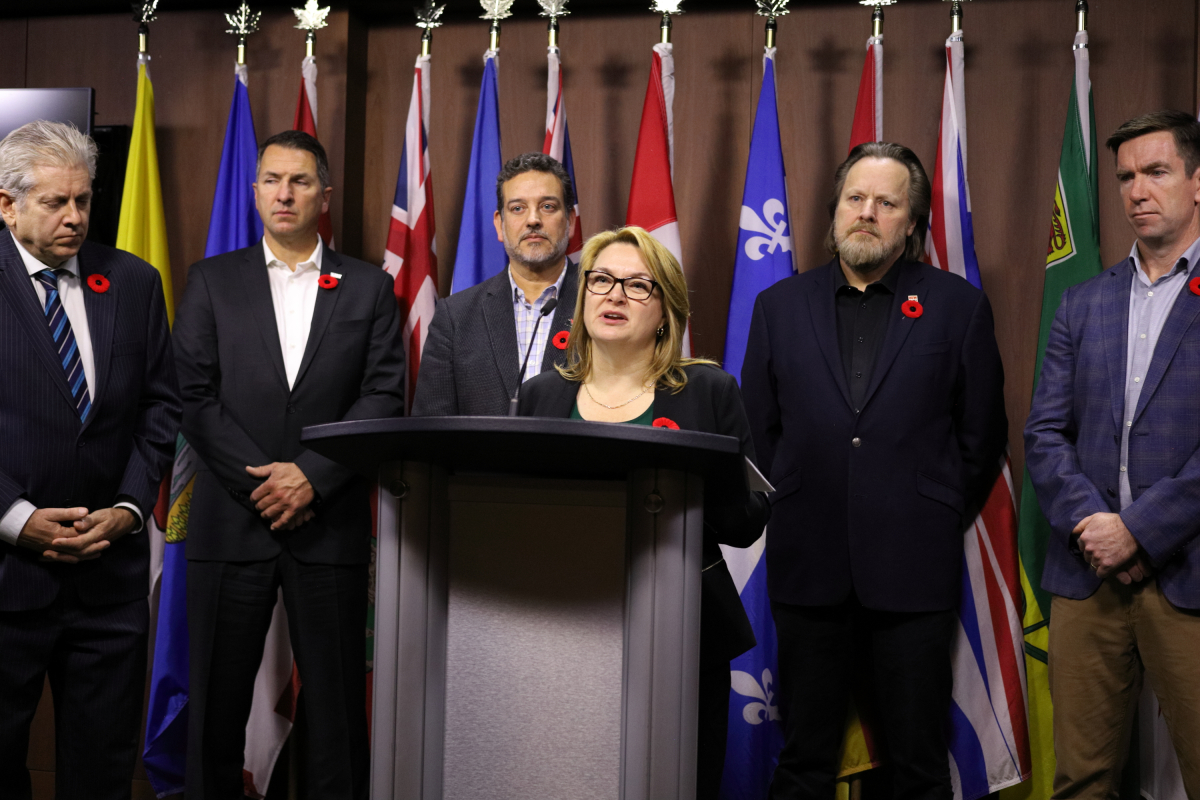Support strong Canadian climate journalism for 2025
Twelve labour and environmental groups are urging federal politicians to get the sustainable jobs act back on the House of Commons agenda so the long-awaited legislation can become law.
In a letter sent Feb. 26, the groups called on government and party leaders to work together to ensure Bill C-50’s “swift progression” after the labour-backed act languished in the natural resources committee for over a month last year.
“I would expect in late April, early May that the bill will be through the House and to the Senate,” said NDP House leader Peter Julian in a phone interview with Canada’s National Observer on Feb. 27.
The sustainable jobs act has been opposed by the Conservatives at every turn. After a month-long delay, Bill C-50 finally cleared the committee stage on Dec. 8 following a tumultuous eight-hour-long committee meeting where Liberal and NDP MPs worked together to make changes and deal with roughly 20,000 Conservative amendments. Now, the Conservatives have 200 amendments, many of which contradict each other, to be voted on when the bill is read for the third time.
“As adults in the room, we're carefully preparing the ground so that, procedurally, we can go with the days of voting that it will take to get C-50 through,” said Julian, adding he hopes this will happen “as soon as possible.”
The 200 amendments demonstrate the Conservatives’ “commitment to delaying and stopping legislation that will create jobs, and help the Canadian workforce gain the skills necessary for the jobs of the future,” said Energy and Natural Resources Minister Jonathan Wilkinson in an emailed statement to Canada’s National Observer.
All these amendments will likely necessitate days of voting in the House of Commons, like in December, when the Conservatives triggered a voting marathon with over a hundred amendments to the government spending bill over the federal Liberals’ refusal to “axe” the federal carbon price.
“It's just a total process block,” said Aliénor Rougeot, program manager for climate and energy at Environmental Defence, describing many of the Conservative amendments as “frivolous.” Given the urgency of the climate crisis and the need to transition the workforce, there will be consequences if the bill is delayed further, she said.
Environmental Defence is one of the 12 organizations that wrote to House leaders from all the parties and Wilkinson and Prime Minister Justin Trudeau urging everyone to work together to expedite Bill C-50.
Calling 2025 a “critical decade” for the energy transition — especially for workers in sectors shifting quickly, like auto manufacturing, steel production and renewable energy industries — Rougeot said even a few months more of delay threatens the efficacy of that first report.
One thing the act would do is require the federal government to publish sustainable job action plans every five years, the first of which will likely be due in 2025. It also requires consultation with a council representing labour groups, industry, Indigenous people and environmental NGOs. But if Bill C-50 doesn’t become law until late this year, that doesn’t leave much time to create a strong jobs action plan, Rougeot told Canada’s National Observer.
“It’s hard to get people to believe in the interest of the bill if the first action plan comes out weak because of this delay,” she said.
Liberal House leader Steven MacKinnon did not directly answer a reporter’s question about when Bill C-50 would be back on the House agenda.
It is “part of a long line of legislation that we want to make progress on,” MacKinnon told media at Parliament Hill on Feb. 26. That same day, MacKinnon introduced a motion that would extend evening sitting hours while also instituting a “health break” at midnight to eliminate these types of all-night voting sessions. He took aim at the Conservatives’ “obstructionist” tactics the following day, saying, “If we put forward an act to call the sky blue, they would obstruct it.”
Wilkinson also did not say when C-50 will be read for a third time and called the “Conservative delays” a “grave concern” for his government and Canadians in an emailed statement to Canada’s National Observer.
“For months, Pierre Poilievre and his MPs have ignored the pleas of workers, unions, and environmental leaders to pass this bill, and taken unparalleled measures — including eight weeks of filibustering and conspiracy theorizing about ‘globalist plots’ and ‘Soviet-style legislation’ — to block workers and youth from taking their rightful seats at the table,” said Wilkinson.
“It should not be too much to ask that parliamentary business gets done efficiently and in good faith to support Canadians,” he said and urged “Pierre Poilievre and his Conservatives to stop harming and disrespecting Canadian workers.”
Conservative House leader Andrew Scheer did not respond to Canada’s National Observer’s request for comment on the letter. It was sent by the Canadian Labour Congress, Blue Green Canada, Canadian Centre for Policy Alternatives, Climate Action Network, Council of Canadians, David Suzuki Foundation, Ecojustice, Environmental Defence, Équiterre, Iron & Earth, Pembina Institute and 350 Canada.
“This bill is really sound. There's nothing in there that I think anybody should be concerned about,” said Rougeot.
Rougeot pointed out that the Liberal-NDP supply-and-confidence agreement includes a commitment to move forward with just transition legislation. NDP MP Charlie Angus has worked closely with labour groups and the Liberals to shape the sustainable jobs act.
Natasha Bulowski / Local Journalism Initiative / Canada’s National Observer
This article was updated to include comments from federal Energy and Natural Resources Minister Jonathan Wilkinson and NDP House leader Peter Julian






Comments
The bill everyone wants passed but the conservatives must be good, given how much effort the conservatives are putting into obstructing the passage. It seems like a page out of the Trumpian playbook to block anything they want to take credit for if elected.
Someone should just put forward a movement to vote on all the Conservatives' 200+ bullshit amendments as a bundle. And they should include the term "bullshit amendments" in the wording of the motion.